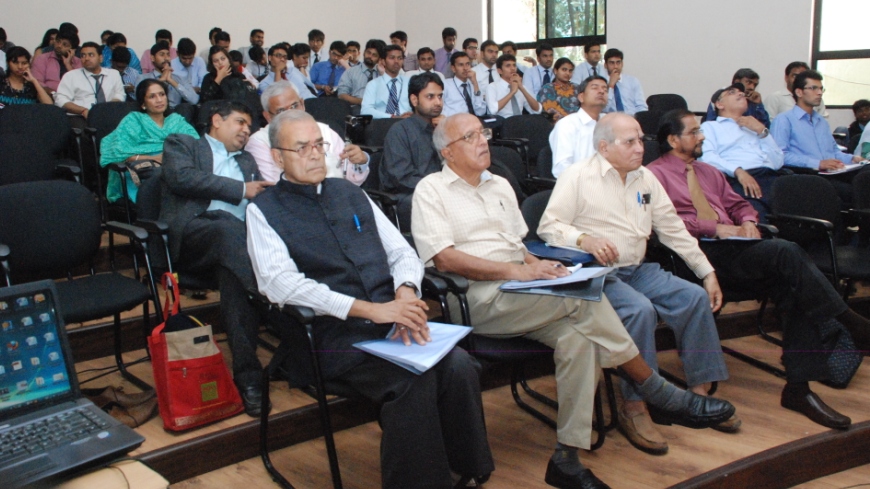
Workshop on Co-Responsibility
IBA Center for C School, Indus Business Academy (IBA), Bangalore
Rights & Responsibility Collective and Eco Foundation for Sustainable Alternatives (EFSA), Bangalore
Announce
Topic: Workshop on Co-responsibility: Interactive Dialogue on Ethics, Human Rights & Responsibilities for Just Society
Date: 8th October 2013
Time: 10 am – 1 pm
Venue: Indus Business Academy (IBA), Bangalore
Keynote address: Ms. Edith Sizoo, International Coordinator, Forum of Ethics and Responsibilities, France
Workshop Chair: Dr. Subhash Sharma, Director, IBA, Bangalore
The objectives of the Interactive Workshop
To create and develop a culture of responsibility and co-responsibility in a world overwhelmed by unethical and irresponsible behavior and attitudes – irresponsibility within governments, business, education, media, arts, academia, and other sectors.
To develop a strategy of intervention by educational institutions including business schools, academia, civil society organizations, human rights activists, and other professionals to combat the culture of rampant irresponsibility, responsibility as such has become almost a forgotten ethical value and moral virtue.
Concept Note on Workshop
The fundamental characteristics which human beings have in common, is a sense of responsibility expressed in our everyday discourses; whether in families or in societies the word ‘responsibility’ comes out spontaneously than rights with the expressions like ‘why did you fail in your responsibility, you should be responsible, you should take responsibility, behave responsibly, I have responsibility, you have failed in responsibility etc. It is a willingness to take care of what is valued and is embedded in our ethical and moral systems and cultural traditions, which defines human relationship and behavioral patterns.
Responsibility is not an abstract concept. It is identifiable because it is concretely grounded in our relationship with each other, which means taking responsibility for something / someone / others. It is the ability of human beings to respond to challenges posed by themselves, their social and their natural environment. The concept of responsibility is a uniting idea not only transcending the citizenship of any country or membership of any Nation but as the foundational basis of every human intercourse.
Every human being living on this earth is responsible not only for himself /herself, but responsible for everything that is happening. How each of us translates that in our human and social relationships? Not as an intellectual conclusion, as an ideal, and so on; but the truth is that we are standing on the ground which is common to all humankind, and feel totally responsible, then our action towards society, towards the world in which we are actually belong. It is our sense of responsibility urges us to bring about tremendous change in the world which is full of violence and competitiveness between nations. This responsibility arises because we are all part of society and par take the tremendous sorrow of men and women and share in our effort to overcome pain and anxiety.
Human responsibility plays an important role in defending Human Rights. The notion of responsibility goes in tandem with the feeling of not being only responsible but being entrusted with rights. It calls to intervene in situation of injustice and protect the aggrieved party with all sorts of help and brings the existing human rights violation to the public. Responsibility implies that the active support of other people in the struggle for justice and a joint effort towards the wellbeing of all. It is only through a feeling of responsibility and co- responsibility towards the community, through compassion for our fellow human beings and through assistance rendered to those weaker than us that the inter-personal relationships, which form the basis of human community and togetherness, can develop. Social responsibility implies that building solidarity which is the strongest force in the struggle against injustice.
As has been observed: ‘the world is a dangerous place, not so much because of those who do evil, but because of those who watch and sit by and let things happen’. Many are those who can assume responsibility, but prefer to do nothing and to remain free-riders. Many are also those who strenuously try to reduce their responsibilities. They feel uneasy about the need to answer for the consequences of their decisions in a world that is becoming more and more complex and characterized by an increasing interdependence among its components. They do not want to be held responsible for (known and unknown) negative effects of their behavior. Consequently, these negative effects are not taken care of.
In spite of all these diversities, however, a sense of responsibility and co-responsibility is common to all human beings. A proposal for a ‘Universal Declaration of Human Responsibilities’ to be issued by the UN would appeal to this sense. It would serve as a countervailing force against irresponsible behavior. It would complement the two existing pillars of international life: the Charter of the United Nations on Peace and Development, and the Universal Declaration of Human Rights. Given its status and authority, equipping the UN with a Universal Declaration of Human Responsibilities as a third pillar would significantly boost efforts to counteract tendencies to abstain from doing what should be done. Just as the Universal Declaration of Human Rights has succeeded in strengthening the establishment of basic rights, so would a Universal Declaration of Human Responsibilities strengthen the application of the Principle of Responsibility?
The UN needs such a Charter highlighting the importance of that principle, describing major areas related to societal relations and the biosphere where responsibilities have to be assumed; and areas where responsibilities are common but have to be shared according to people’s access to information, knowledge and power. Explicit references to these responsibilities will implicitly point to irresponsible behavior. This would stimulate juridical steps to discourage acting in irresponsible ways. Thus the struggle to fend off the dangers threatening humanity and the biosphere can be advanced more forcefully.
There is growing perception that excessive emphasis on exercise of fundamental rights by citizens diminishes the importance of performance of correlated duties and responsibilities. The thinking that every right gives rise to a corresponding duty is based on the premise that freedom without acceptance of responsibility can destroy the freedom itself, whereas when rights and responsibilities are balanced, freedom is enhanced.
It is the responsible action that alone carries with it the requisite integrity that brings about real change. Therefore, unless we can transform the present culture of irresponsibility into a culture of responsibility, social movement of any kind, including peace movements, will bear only bitter fruit, if any.
Interested participants are invited to join us for the workshop and participate in the discussions and dialogues. Please confirm your participation by Oct. 5, 2013.
Bio note: SIZOO Edith
Edith SIZOO, born in the Netherlands (1939) , Masters degree from the Free University of Amsterdam, Netherlands, is a socio-linguist, has worked within the framework of Development Cooperation, in Hong Kong and India, at the Ministry of Foreign Affairs of the Netherlands, as Director of the Netherlands federation of Non-Governmental Development Organisations, as International Coordinator of the Network Cultures and Development in Brussels, where she was responsible in particular for its programmes on “Language and intercultural communication” and “Female thinking and social transformation”.
Since 2003 she is coordinating an international process, initiated by the Foundation Charles Léopold Mayer, for the promotion of a Universal Charter of Human Responsibilities.
She serves as International Coordinator of the Forum on Ethics & Responsibility:
She has coordinated several intercultural research projects and directed the ensuing publication of books related to the research concerned:
CULTURES ENTR’ ELLES: DYNAMIQUE OU DYNAMITE? SIZOO, E. et VERHELST, T.G., co-éditeurs, deux tomes, Editions Charles Léopold Mayer, Paris, 1994
WOMEN’S LIFE WORLDS – narratives on women’s ways of shaping their realities, SIZOO, E. (ed), Routledge, London, 1990
UNIVERS DE FEMMES – récits de femmes à la croisée des cultures du XXe siècle, SIZOO, E., INDIGO&Côté Femmes, paris, 1998
CE QUE LES MOTS NE DISENT PAS: l’art de l’écoute interculturelle, SIZOO, E., Editions Charles Léopold Mayer, Paris, 1999
WHAT WORDS DO NOT SAY: the art of intercultural listening, SIZOO, E., Editions Charles Léopold Mayer, Paris, 1999
PAR DELA LE FEMINISME, SIZOO, E., Editions Charles Léopold Mayer, Paris, 2004.
RESPONSABILITE ET CULTURES DU MONDE, sous la direction de SIZOO, Edith,
Editions Charles Léopold Mayer, Paris, 2008.
